Ecommerce businesses face many challenges, but keeping track of stock levels is one of the biggest. Without good inventory management, you might run out of popular items or end up with too many products that don’t sell well. This can hurt your profits and disappoint customers.
The right ecommerce inventory management software can help you stay on top of your stock and boost your online store’s success. These tools let you track products across different sales channels, set up alerts for low stock, and get insights into which items are selling best. With so many options out there, it’s important to find software that fits your specific needs and budget.
This article reviews the top ecommerce inventory management software for 2025, highlighting key features such as real-time tracking, automated replenishment, and multi-channel integration to streamline inventory processes. It compares 15 software options, detailing their benefits, pricing, and suitability to help businesses select the best solution for efficient stock management and growth.
FAQ
Is there free inventory management software available?
Yes, there are several free inventory management software options available, such as Odoo and Zoho Inventory’s free tier, which can be suitable for small businesses or startups looking to manage their inventory without incurring costs.
What is the best software for small businesses?
The best inventory management software for small businesses often depends on specific needs, but popular options include TradeGecko, Zoho Inventory, and Square for Retail, which offer user-friendly interfaces and essential features tailored for smaller operations.
Can I download inventory management software for free?
Many inventory management software solutions offer free trials or free versions that can be downloaded, allowing users to test the software before committing to a paid plan.
What is Zoho Inventory used for?
Zoho Inventory is a cloud-based inventory management software used for tracking inventory levels, managing orders, and streamlining the supply chain, making it easier for businesses to manage their stock across multiple sales channels.
Are there jobs in ecommerce inventory management?
Yes, there are numerous job opportunities in ecommerce inventory management, including roles such as inventory manager, supply chain analyst, and logistics coordinator, as businesses increasingly rely on efficient inventory practices to enhance their operations.
How to manage inventory across multiple channels?
To manage inventory across multiple channels, businesses can use centralized inventory management software that integrates with various sales platforms, allowing real-time tracking and updates to prevent overselling and stock discrepancies.
Does Shopify have an inventory management app?
Yes, Shopify offers built-in inventory management features and supports various third-party inventory management apps, allowing merchants to efficiently track stock levels and manage orders directly from their Shopify dashboard. [/faq[faq question=”What are the steps to manage inventory effectively?”]Effective inventory management involves regularly tracking stock levels, forecasting demand based on sales data, organizing inventory for easy access, and implementing a reliable inventory management system to streamline processes.
Can Shopify handle inventory management tasks?
Yes, Shopify can handle essential inventory management tasks, including tracking stock levels, managing product variants, and notifying users of low stock, making it suitable for ecommerce businesses of all sizes.
Which software is best for inventory management?
The best inventory management software varies by business needs, but options like Fishbowl, TradeGecko, and NetSuite are highly regarded for their robust features, scalability, and ease of use for different types of businesses.
Create your online store in minutes!
Looking to sell online? Develop and launch your store with 10Web AI Ecommerce Website Builder.
Key features of ecommerce inventory management software
Ecommerce inventory management software offers tools to streamline operations and boost efficiency. These systems help online sellers track stock, automate reordering, and manage sales across multiple platforms.

Real-time inventory tracking
Real-time inventory tracking gives you up-to-the-minute data on your stock levels. This feature lets you see exactly what products are available and where they’re located. You can quickly spot low stock items and avoid overselling.
Many systems use barcode scanning to update inventory as items move. This cuts down on manual data entry and reduces errors. You’ll get alerts when stock drops below set thresholds.
Real-time tracking also helps with forecasting. You can spot trends in sales and adjust your inventory accordingly. This helps you keep popular items in stock without tying up too much money in excess inventory.
Automated stock replenishment
Automated stock replenishment takes the guesswork out of reordering. The software tracks your sales and stock levels. When inventory gets low, it can create purchase orders automatically.
You set rules for when to reorder based on factors like:
- Minimum stock levels
- Lead times from suppliers
- Seasonal demand
This saves you time and helps prevent stockouts. You don’t have to manually check inventory and place orders. The system does it for you based on your preset rules.
Automated replenishment also helps you take advantage of bulk discounts. You can set the system to order larger quantities when prices are lower.
Multi-channel integration
Multi-channel integration connects your ecommerce inventory management software to all your sales channels. This includes your website, marketplaces like Amazon, and even brick-and-mortar stores.
When you make a sale on any platform, the inventory updates across all channels. This prevents overselling and keeps your stock levels accurate.
Multi-channel integration also helps with order fulfillment. You can see all your orders in one place, no matter where they came from. This makes it easier to process and ship items quickly.
Many systems can also sync product information across channels. You can update prices or descriptions in one place, and the changes apply everywhere you sell.
Benefits of using ecommerce inventory management software
Ecommerce inventory management software helps businesses run smoothly and make more money. It makes work easier, keeps customers happy, and cuts costs.
Enhanced operational efficiency
Good inventory software saves you time and effort. It updates stock levels automatically when orders come in or items are restocked. This stops you from overselling products you don’t have.
The software can also predict when you’ll run low on items. It tells you when to order more so you don’t run out. Some systems even place orders for you when stock gets low.
Many tools connect with other business software, allowing data flow between systems without extra work. For example, sales info can go straight to your accounting software.
Improved customer satisfaction
When you use inventory software, you’re less likely to disappoint customers. You can see exactly what’s in stock and avoid selling items that aren’t available.
The software helps you ship orders faster. It can show workers where items are stored and the best way to pack them. This means customers get their purchases quicker.
Some systems let customers track their orders easily. They can see when an item ships and where it is. This keeps them informed and reduces questions to your support team.
Cost reduction and profitability
Inventory software helps you save money in several ways. It shows which products sell best and which don’t move. This helps you decide what to stock more of and what to stop buying.
The software can find the best prices from different suppliers. It might even negotiate better deals based on your ordering history.
By keeping just enough stock, you spend less on storage. You also avoid waste from items that expire or go out of style. This all adds up to more profit for your business.

Create your online store in minutes!
Looking to sell online? Develop and launch your store with 10Web AI Ecommerce Website Builder.
Considerations when purchasing ecommerce inventory management software
When you’re looking for ecommerce inventory management software, there are several key factors to keep in mind. The size of your business plays a big role in choosing the right solution. Small businesses may need different features than large enterprises.

Integration capabilities are vital. You’ll want software that works well with your existing ecommerce platform and other tools. This helps create a smooth workflow and reduces manual data entry.
Pricing is another important aspect. Some software offers free plans for small businesses, while others have tiered pricing based on features or inventory size. Think about your budget and the value you’ll get from the software.
Features to look for include:
- Real-time inventory tracking
- Multi-channel selling support
- Order fulfillment tools
- Reporting and analytics
- Barcode scanning
Consider the ease of use and user interface. You want software that’s simple to learn and use daily. Good customer support is also key, especially when you’re getting started.
Scalability matters too. As your business grows, you’ll need software that can grow with you. Look for options that offer more advanced features as you expand.
Remember to check reviews and ask for demos before making a choice. This helps you get a feel for how the software works in practice.
15 best ecommerce inventory management softwares
This section reviews 15 leading ecommerce inventory management software options, detailing their features, pricing, and suitability for different business sizes to help streamline stock tracking, order processing, and multichannel sales management. It highlights each tool’s strengths and drawbacks, guiding you in selecting the right solution for efficient inventory control.
1. Tradegecko
Tradegecko is a cloud-based ecommerce inventory management software that helps businesses handle their inventory and operations. It’s designed for small to mid-sized companies looking to streamline their processes.
You’ll find Tradegecko easy to use and understand. The software offers features to manage inventory, track sales, and generate reports. Many businesses see increased sales revenue after using Tradegecko for a year.
One thing you might like about Tradegecko is its ability to work with large companies and small businesses alike. The pricing is flexible enough to fit different budgets. You’ll also appreciate how it simplifies inventory management, reducing errors in the process.
On the downside, some users find Tradegecko’s reporting features limited. You might need to look elsewhere for more advanced analytics.
Tradegecko’s pricing starts at around $39 per month, with higher tiers available for more features.
| Pros | Cons |
| User-friendly interface | Limited reporting features |
| Suitable for various business sizes | May lack advanced analytics |
| Helps increase sales revenue | Higher tiers can be pricey |
We chose Tradegecko for its user-friendly interface and its track record of helping businesses boost sales. It’s best for small to medium-sized ecommerce businesses that want to improve their inventory management without a steep learning curve.
2. Zoho Inventory
Zoho Inventory is a cloud-based software that helps you manage your ecommerce inventory. It’s designed for small to medium-sized businesses that sell products across multiple channels.
With Zoho Inventory, you can track stock levels, process orders, and handle shipping all in one place. The software connects to various online marketplaces and shopping carts, making it easier to keep everything in sync.
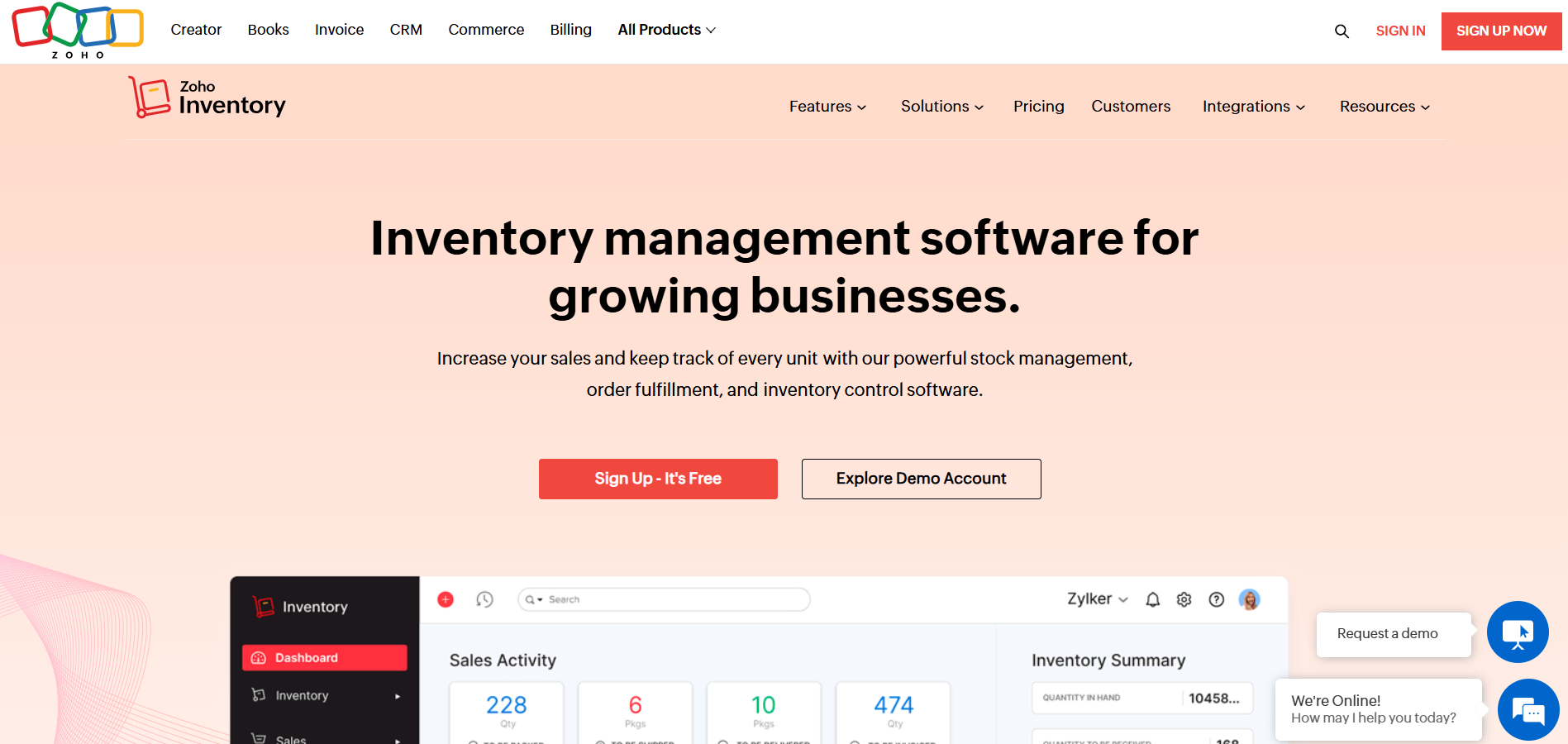
You’ll find features like low stock alerts, barcode scanning, and the ability to manage multiple warehouses. These tools can help you avoid stockouts and keep your inventory organized.
Zoho Inventory integrates with other Zoho apps and third-party services. This lets you link your inventory management with accounting, customer service, and other business functions.
The software offers different pricing tiers based on your business needs. You can start with a free plan for very small operations or choose paid plans as your business grows.
| Pros | Cons |
| Easy to use interface | Some users report glitches |
| Multichannel selling support | Limited customization options |
| Integrates with other tools | May be too basic for large businesses |
Zoho Inventory is a good choice if you’re looking for a straightforward way to manage your ecommerce inventory. It’s best suited for small to medium-sized businesses that want to streamline their operations without a complex setup process.
3. Cin7
Cin7 offers inventory management software for product sellers. It gives you a real-time view of your products across different systems, channels, and regions. The platform includes features like low-stock alerts and integrations with popular ecommerce platforms such as Amazon and eBay.
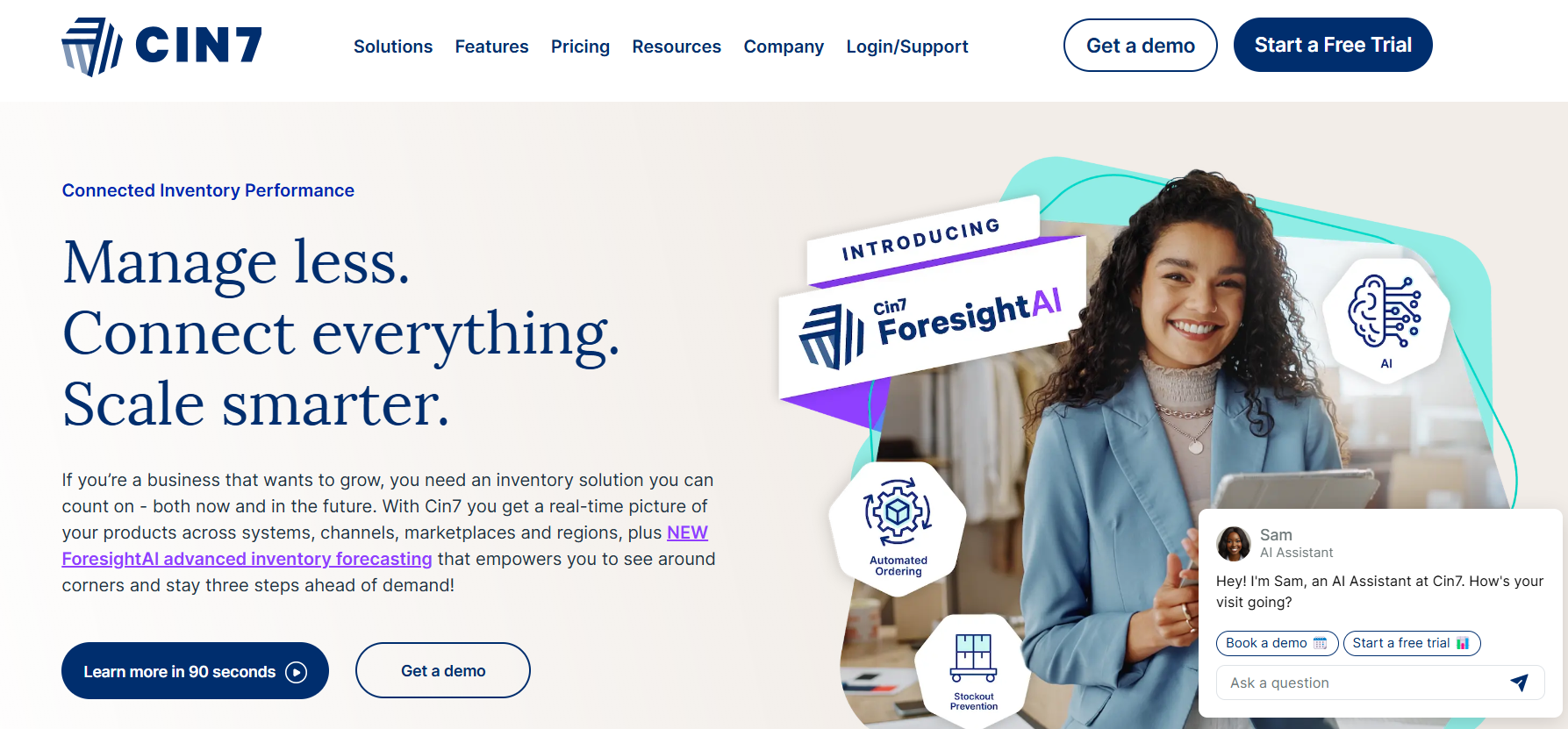
You’ll find Cin7 useful for tracking costs and sales at the item level. It provides up-to-date data across all your sales channels, helping you stay on top of your inventory. The software also includes a new feature called ForesightAI for advanced inventory forecasting.
Cin7’s pricing starts at $349 per month. This puts it in the mid-range for inventory management solutions.
| Pros | Cons |
| Real-time inventory tracking | Higher starting price |
| Multichannel integration | May have a learning curve |
| Advanced forecasting feature | Might be too complex for very small businesses |
You might choose Cin7 if you need a system that can handle multiple sales channels efficiently. It’s a good fit for businesses that want to manage their inventory across various platforms from one central system.
4. Veeqo
Veeqo is a powerful ecommerce inventory management software that helps retailers streamline their operations. You can use it to manage inventory, orders, and shipping across multiple sales channels.
With Veeqo, you can connect your online stores and marketplaces like Amazon, eBay, Shopify, and Walmart. This allows you to keep track of all your products in one central place.
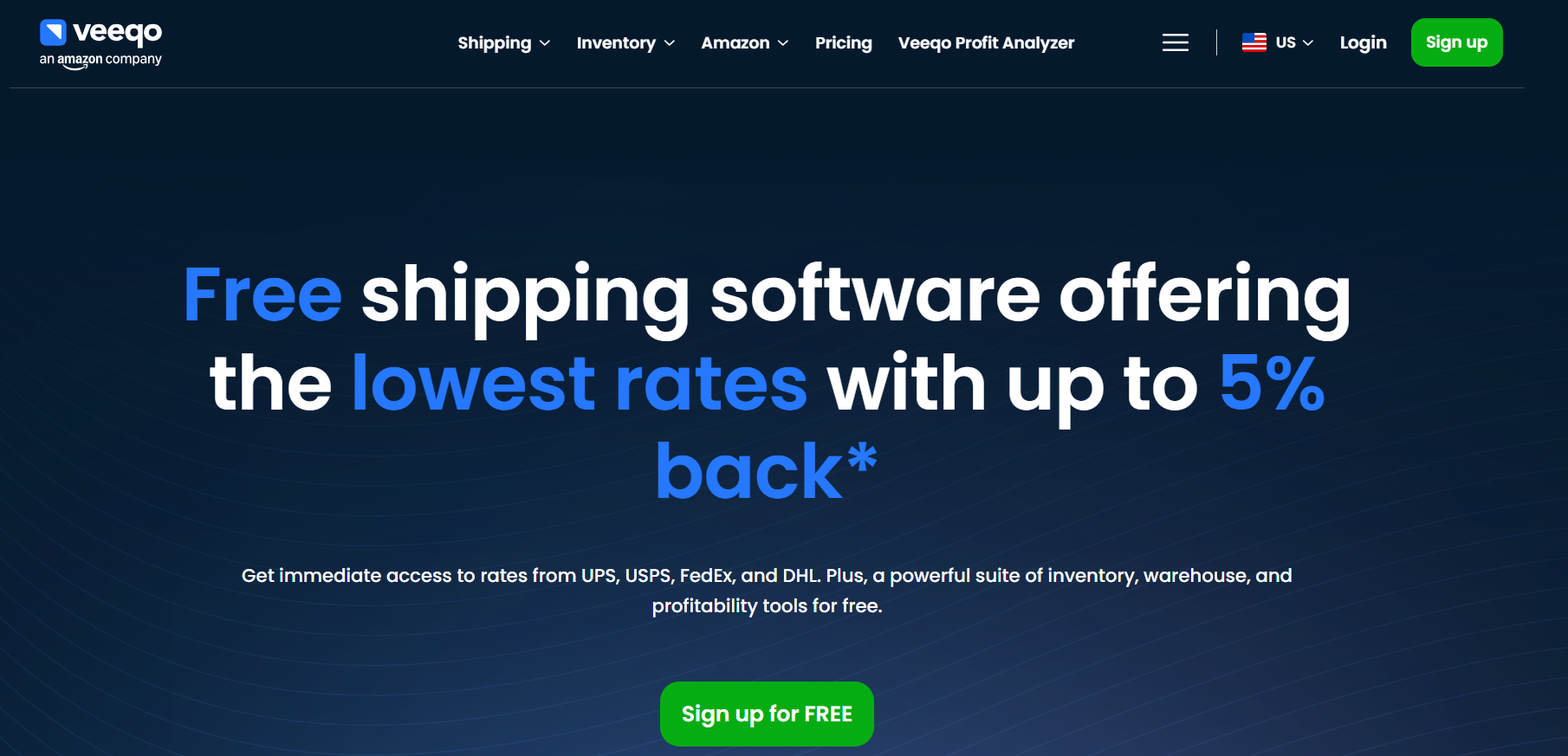
The platform offers useful features such as inventory automation, demand forecasting, and returns management. These tools can help you make smarter decisions about stock levels and improve customer satisfaction.
Veeqo’s shipping integrations let you compare rates from different carriers and print labels quickly. This can save you time and money on order fulfillment.
| Pros | Cons |
| Integrates with many popular sales channels | May have a learning curve for new users |
| Offers inventory forecasting | Some advanced features might be unnecessary for small businesses |
| Includes shipping features |
Veeqo’s pricing isn’t publicly listed, so you’ll need to contact them for a quote. The software is likely best suited for growing businesses that sell on multiple channels and need help managing their inventory and orders efficiently.
5. Orderhive
Orderhive is a powerful ecommerce inventory management software that helps online sellers streamline their operations. It offers tools to manage inventory, orders, and shipping across multiple sales channels.
You can use Orderhive to automate many tasks in your ecommerce business. The software connects to popular platforms like Amazon and eBay. This lets you sync inventory and orders in real-time.
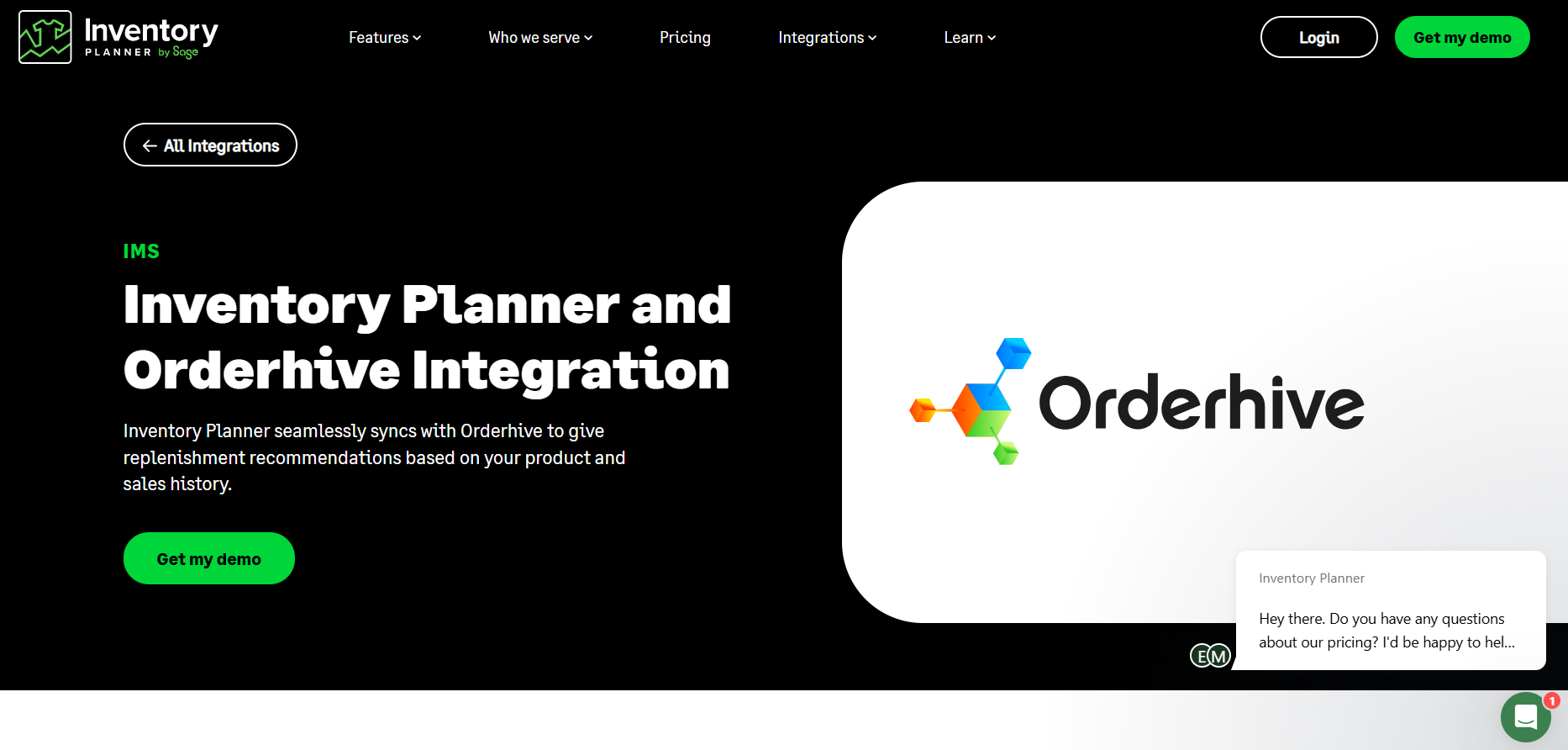
Orderhive’s barcode scanning feature makes it easy to track products. You can also set up automatic reorder points to avoid stockouts. The software provides detailed reports to help you make smart decisions about your inventory.
One downside is that Orderhive can take time to set up and learn. Some users find the interface a bit complex at first. The software also lacks some advanced features found in pricier options.
Orderhive offers plans starting at $0 per month for basic features. Paid plans range from $299 to $349 monthly for more advanced tools.
| Pros | Cons |
| Integrates with many ecommerce platforms | Can be complex to set up |
| Real-time inventory syncing | Learning curve for new users |
| Affordable pricing options | Some advanced features missing |
We picked Orderhive because it offers good value for small to medium-sized ecommerce businesses. It’s a solid choice if you need help managing inventory across multiple channels without breaking the bank.
Orderhive works best for growing online retailers who want to automate their processes. It’s ideal if you sell on several platforms and need a central system to keep everything organized.

Create your online store in minutes!
Looking to sell online? Develop and launch your store with 10Web AI Ecommerce Website Builder.
6. Fishbowl Inventory
Fishbowl offers inventory management software for businesses. It has two main products: Fishbowl Warehouse and Fishbowl Manufacturing. These tools help you track stock, manage orders, and optimize warehouse operations.
You can use Fishbowl to process customer orders quickly. It shows updates, issues, and shipping info in one place. The software also helps with receiving goods, moving products, and packing orders for shipment.
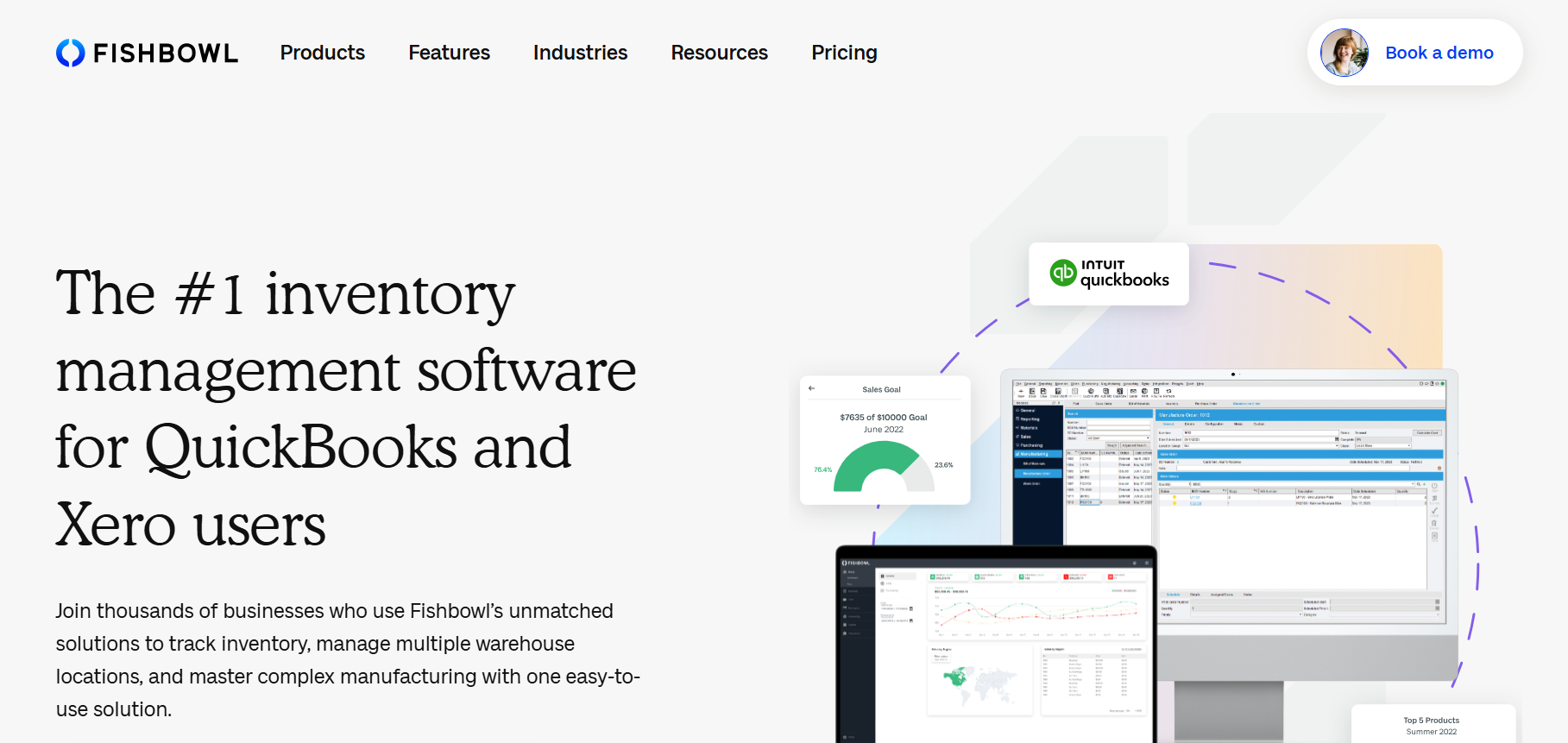
Fishbowl works well with QuickBooks and Xero. This makes it easier to keep your financial records up to date. The software can also connect to many ecommerce platforms.
One downside is the cost. Prices start at $329 per month for the warehouse module. The manufacturing module costs $429 per month. You may need to pay extra for add-ons or hosting.
| Pros | Cons |
| Works with QuickBooks and Xero | Can be expensive |
| Offers both warehouse and manufacturing tools | May need to pay for extra features |
| Connects to ecommerce platforms | Might be too complex for very small businesses |
Fishbowl is a good choice if you need detailed inventory control. It works well for growing businesses that sell online and offline. The software can handle complex tasks, which makes it useful as your company expands.
7. Netsuite
NetSuite offers a powerful ecommerce inventory management software solution. This cloud-based platform helps businesses handle their stock levels, orders, and deliveries. You can use it to automate many parts of your inventory process.
NetSuite’s Smart Count feature lets you do inventory counts without stopping all transactions. This means you can keep your business running while still getting accurate stock numbers. The system takes a snapshot of inventory levels for each item when you start counting.
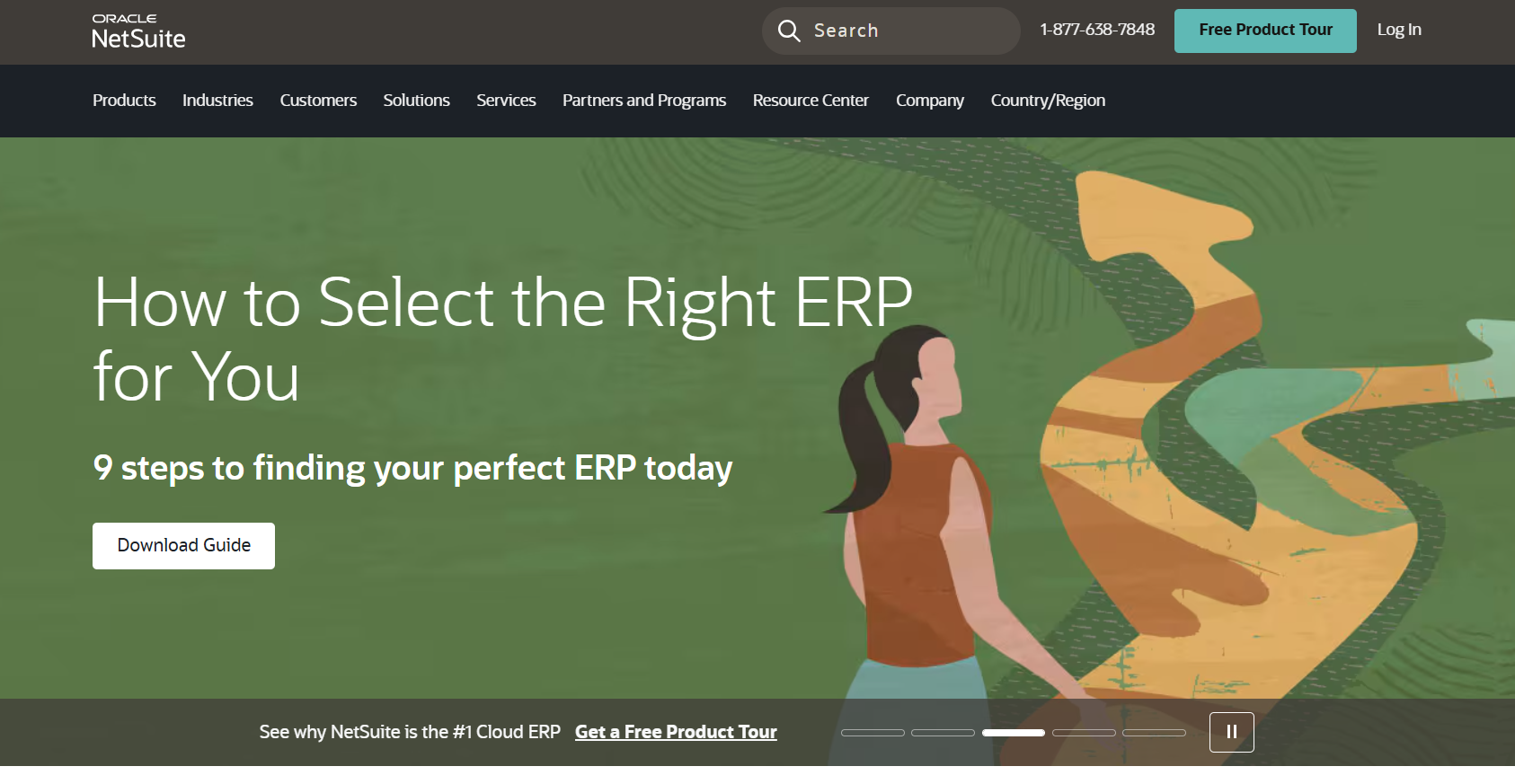
You’ll like how NetSuite connects all parts of your business. It brings together data from sales, inventory, and customer info. This gives you a complete view of your operations in one place.
One downside is that NetSuite can be complex to set up and use. You might need help from experts to get the most out of it. The cost can also be high for smaller businesses.
NetSuite’s pricing isn’t public, but it’s generally considered a premium option. You’ll need to contact them for a custom quote based on your needs.
| Pros | Cons |
| All-in-one business solution | Can be complex to use |
| Real-time inventory tracking | Higher cost |
| Automated counting features | May require expert help to set up |
We chose NetSuite because it offers a full suite of business tools beyond just inventory management. It’s a good fit if you want an all-in-one solution for your growing business.
8. Skuvault
Skuvault is an inventory management software designed for ecommerce businesses. It helps you track and manage your stock across multiple sales channels. The system offers real-time updates to keep your inventory accurate.
You can use Skuvault to streamline your picking, packing, and shipping processes. It connects with many popular marketplaces and shopping carts. This makes it easier to sync your inventory data.
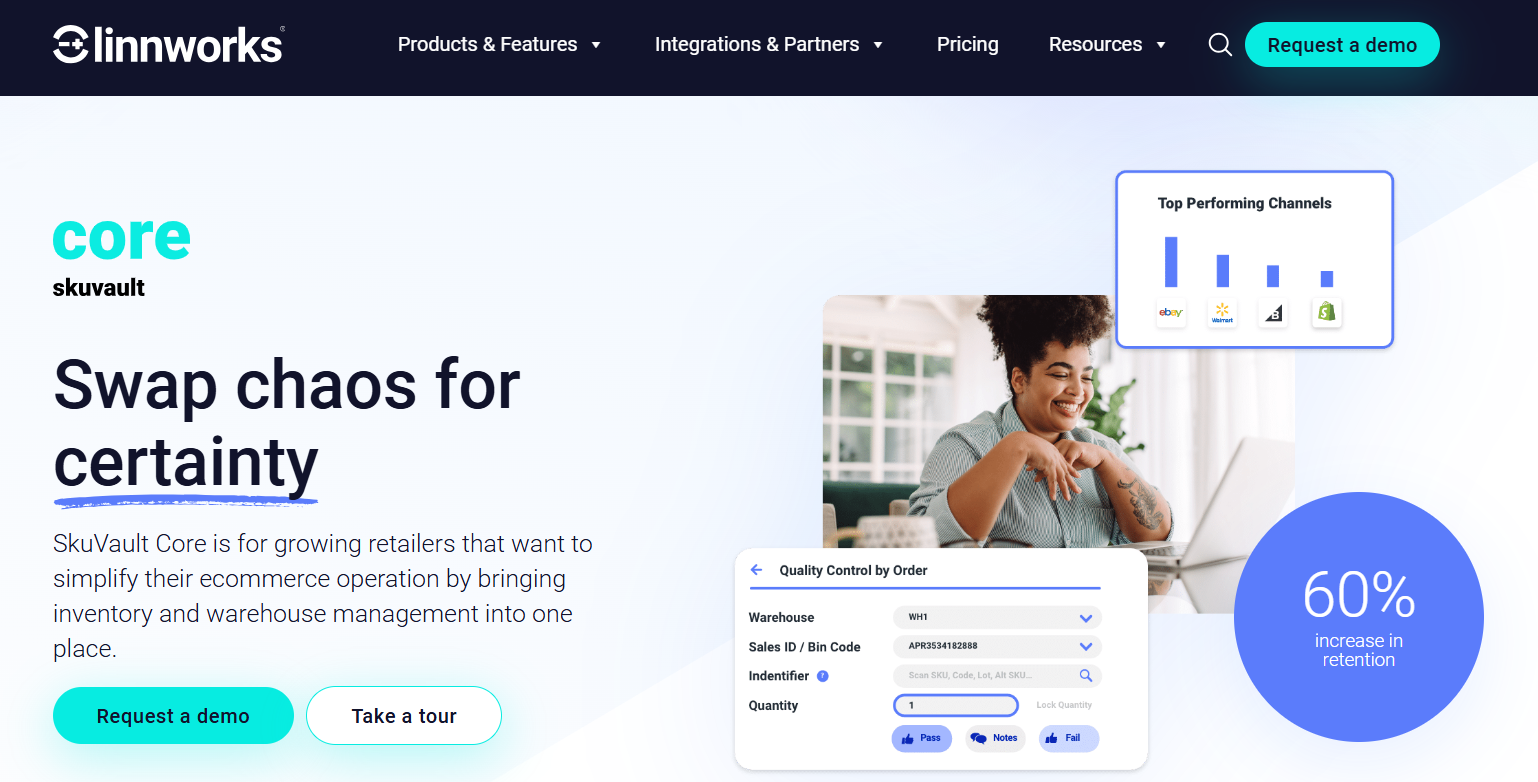
Skuvault provides detailed reporting tools. These help you make smarter decisions about your stock levels. You can see which products are selling well and which ones aren’t moving.
The software is good for medium to large businesses. It works best if you sell on several platforms or have a complex inventory setup.
Skuvault’s pricing isn’t publicly listed. You’ll need to contact them for a quote based on your business needs.
| Pros | Cons |
| Real-time inventory updates | May be too complex for very small businesses |
| Integrates with many platforms | Pricing not transparent |
| Detailed reporting tools | Might have a learning curve |
We picked Skuvault because it offers advanced features for growing ecommerce operations. It’s a good fit if you need help managing a large product catalog or multiple warehouses.
9. Katana MRP
Katana MRP is a cloud-based inventory management software designed for small and medium-sized businesses in ecommerce, manufacturing, and retail. It offers tools to streamline operations and improve efficiency across sales channels.
You can use Katana to manage inventory, track sales, and automate workflows. The software provides real-time visibility into stock levels and sales data, helping you make informed decisions about your business.
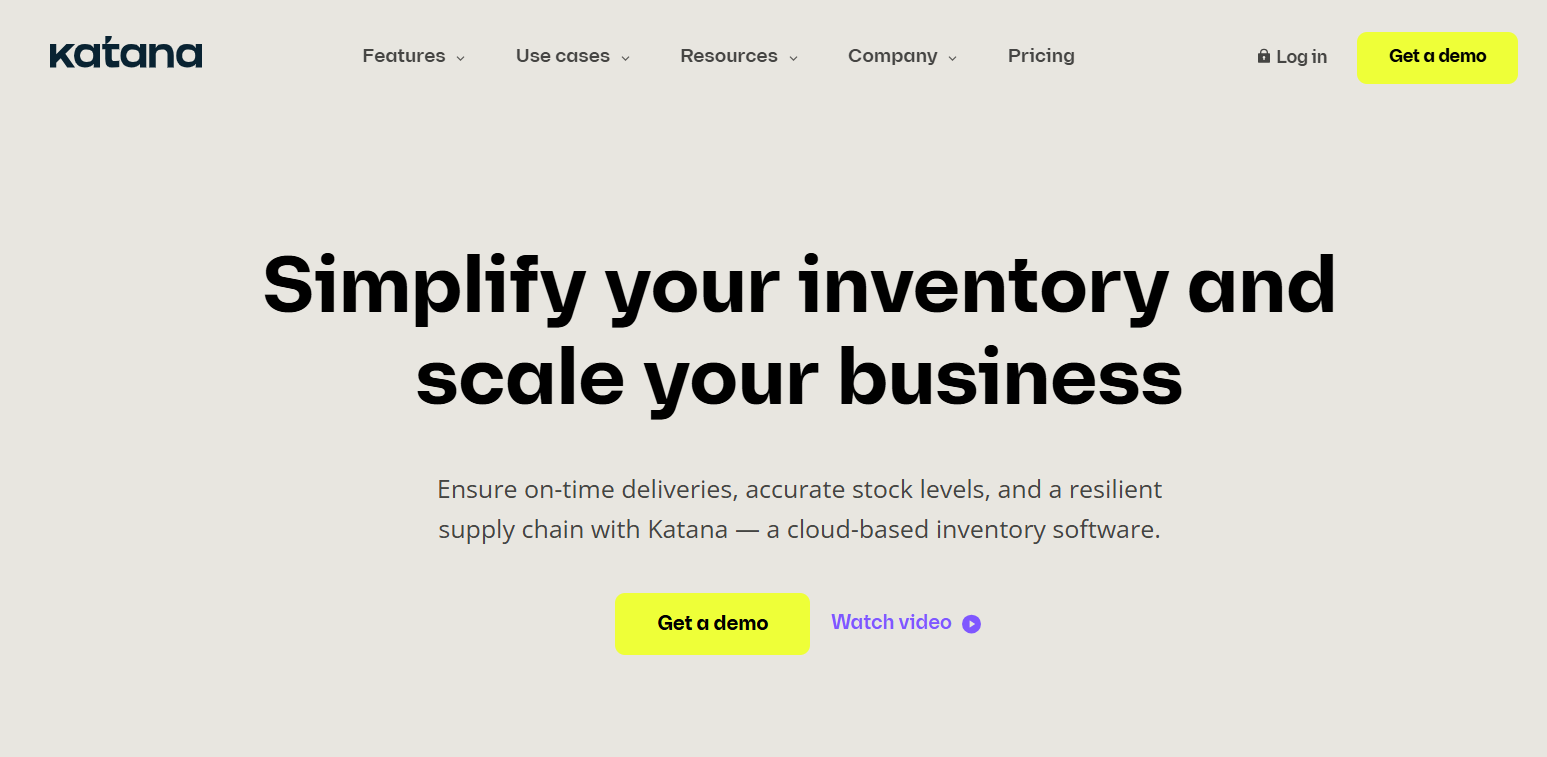
Katana integrates with popular ecommerce platforms, making it easier to sync inventory across multiple sales channels. This feature is helpful if you sell products on different websites or marketplaces.
The software also includes features for product bundling and kit assembly. These tools can save time if you offer product combinations or need to track components for assembled items.
| Pros | Cons |
| Real-time inventory tracking | Can be pricey for small businesses |
| Integrates with ecommerce platforms | Some features have a learning curve |
| Supports product bundling | Limited customization options |
Katana offers different pricing plans to fit various business needs. Plans start at $99 per month and go up to $1,799 per month for larger operations with more complex requirements.
You might choose Katana if you need a tool that combines inventory management with basic manufacturing features. It’s a good fit for businesses that want to streamline their operations and improve inventory accuracy.
10. Shipmonk
ShipMonk is a popular ecommerce inventory management software that offers a complete solution for online retailers. It helps businesses handle their inventory, process orders, and manage shipping all in one place.
You’ll find ShipMonk’s platform user-friendly and packed with features. It connects to over 75 ecommerce platforms and marketplaces, making it easy to sync your sales channels. The software gives you real-time updates on stock levels and helps you avoid overselling.
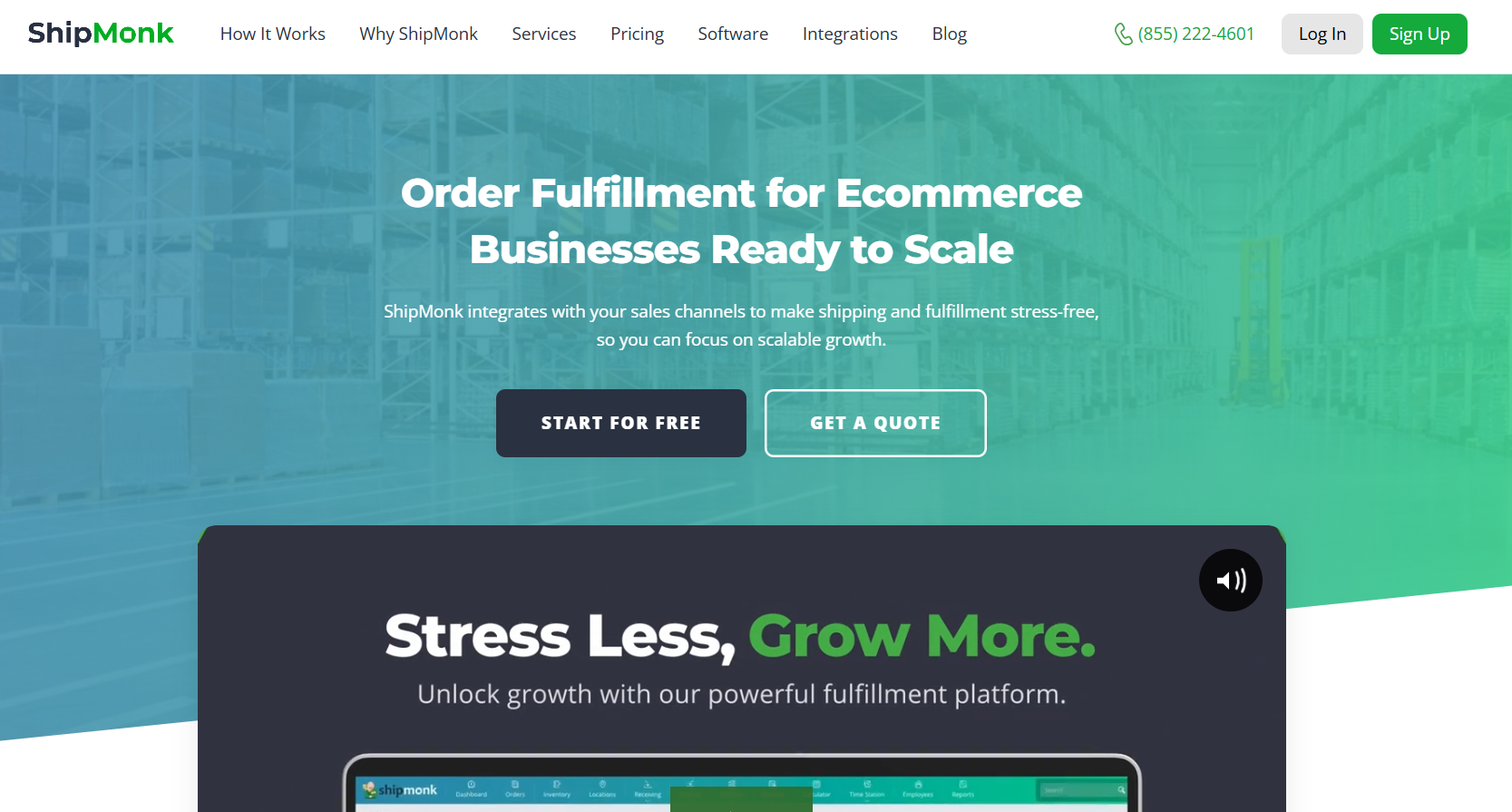
One thing you’ll like about ShipMonk is its focus on growth. They provide tools to help you scale your business without getting bogged down in logistics. Their customer support is also highly rated, which can be a big help when you’re dealing with complex shipping issues.
On the downside, some users find ShipMonk’s pricing a bit high for smaller businesses. The software can also have a learning curve if you’re new to inventory management systems.
ShipMonk’s pricing starts at around $250 per month, with costs increasing based on your order volume and storage needs. They offer custom quotes for larger businesses.
| Pros | Cons |
| Integrates with many platforms | Can be costly for small businesses |
| Good for scaling businesses | May have a learning curve |
| Strong customer support | Pricing can increase with volume |
ShipMonk is best for growing ecommerce businesses that need a powerful system to manage their inventory and fulfillment. If you’re handling a large number of orders across multiple channels, you’ll find ShipMonk’s features helpful in streamlining your operations.
11. QuickBooks Commerce
QuickBooks Commerce is an inventory management platform that helps you handle sales and stock across multiple channels. It’s part of the QuickBooks family of products, which many businesses already use for accounting.
You’ll find QuickBooks Commerce useful if you sell products online through different websites or marketplaces. It lets you keep track of what you have in stock and manage orders from one place.
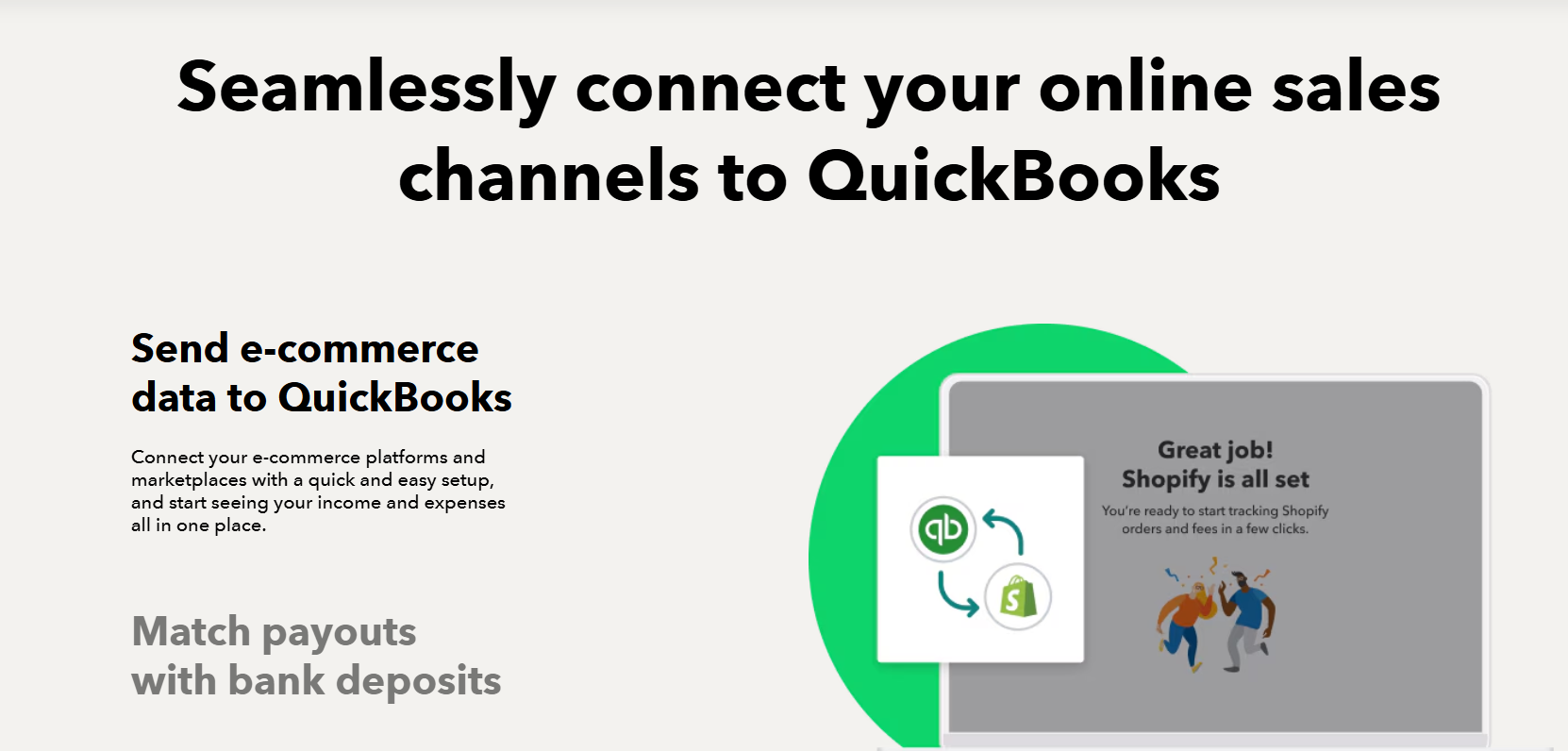
The software starts at $55 per month, making it more affordable than some other options. This lower price point is a big plus for small businesses watching their budgets.
One thing you’ll like about QuickBooks Commerce is how it connects with QuickBooks Online. If you use QuickBooks for your accounting, this integration can save you time and reduce errors.
On the downside, some users say the software can be tricky to set up at first. You might need some time to learn all its features and get everything running smoothly.
| Pros | Cons |
| Affordable pricing | Can be complex to set up |
| Integrates with QuickBooks Online | May lack some advanced features |
| Manages multiple sales channels | Learning curve for new users |
QuickBooks Commerce is best for small to medium-sized online retailers who want a simple way to manage inventory across different sales channels. It’s especially good if you already use other QuickBooks products.
12. Jazva
Jazva offers cloud-based inventory management software for multi-channel sellers. You can list, ship, and sync inventory from one platform. This software helps you manage your ecommerce business across different marketplaces and shopping carts.
Jazva’s all-in-one solution streamlines key functions of multi-channel retail. You can optimize your business operations and stay competitive. The software includes features for product management, order fulfillment, and reporting.
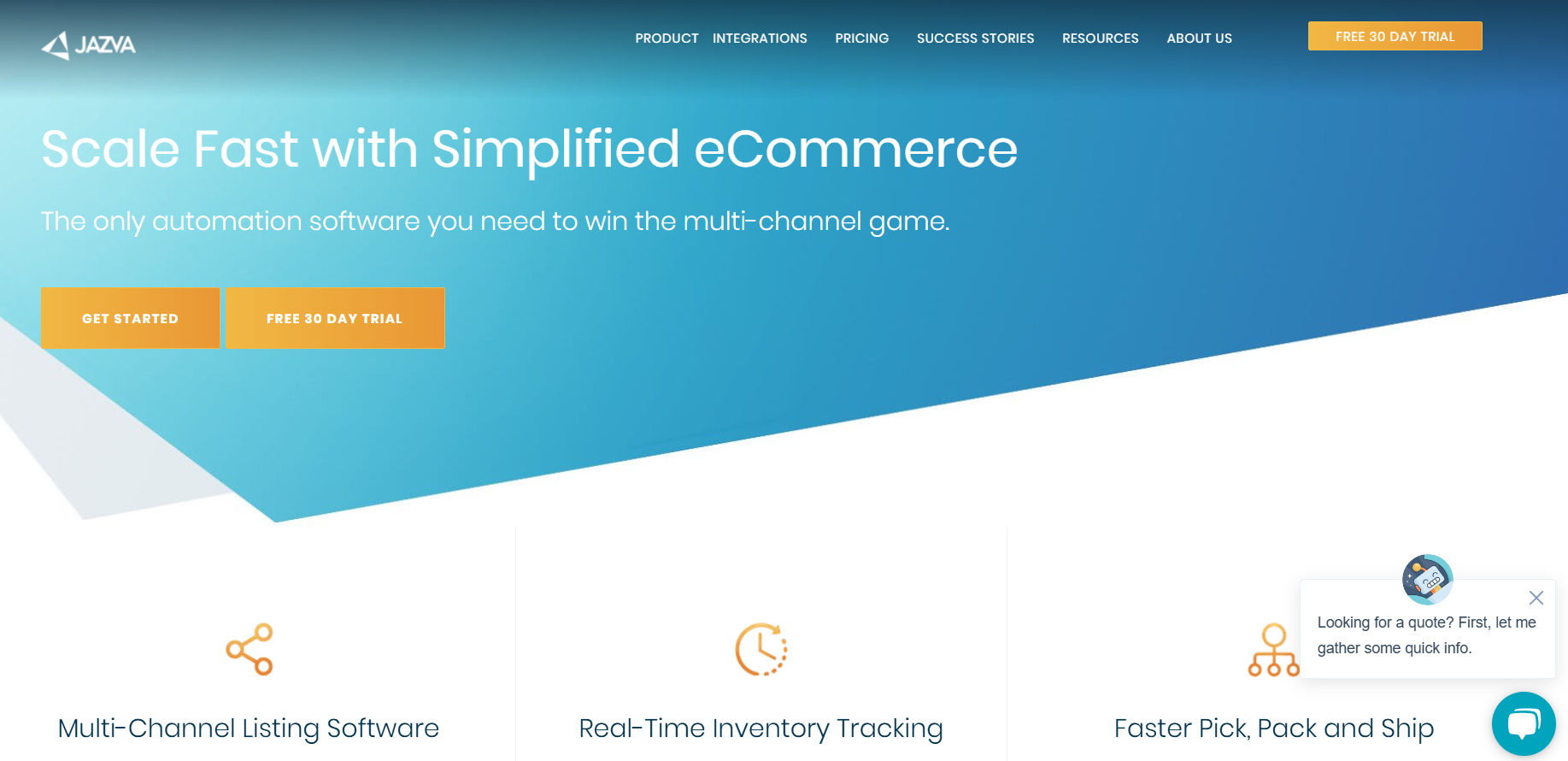
You might like Jazva’s ability to track inventory across multiple locations. It lets you set up and label aisles, shelves, and bins in your warehouse. The customizable prioritization feature can boost your warehouse team’s efficiency.
Some users may find Jazva’s interface less user-friendly compared to other options. The learning curve could be steeper for those new to complex inventory systems.
Jazva’s pricing is not publicly listed. You’ll need to contact their sales team for a custom quote based on your business needs.
| Pros | Cons |
| Multi-channel integration | Pricing not transparent |
| Advanced warehouse management | Potentially steep learning curve |
| Customizable features | May be complex for small businesses |
We chose Jazva for its strong multi-channel capabilities and warehouse management features. It’s best suited for medium to large businesses selling on multiple platforms who want to unify their operations.

Create your online store in minutes!
Looking to sell online? Develop and launch your store with 10Web AI Ecommerce Website Builder.
13. Brightpearl
Brightpearl is an omni-channel retail operations platform designed for ecommerce businesses. It offers inventory management software that integrates with many popular ecommerce systems.
You’ll find Brightpearl helpful for managing inventory across multiple sales channels. It speeds up order processing with automated workflows, making it easier to keep up with customer demands.
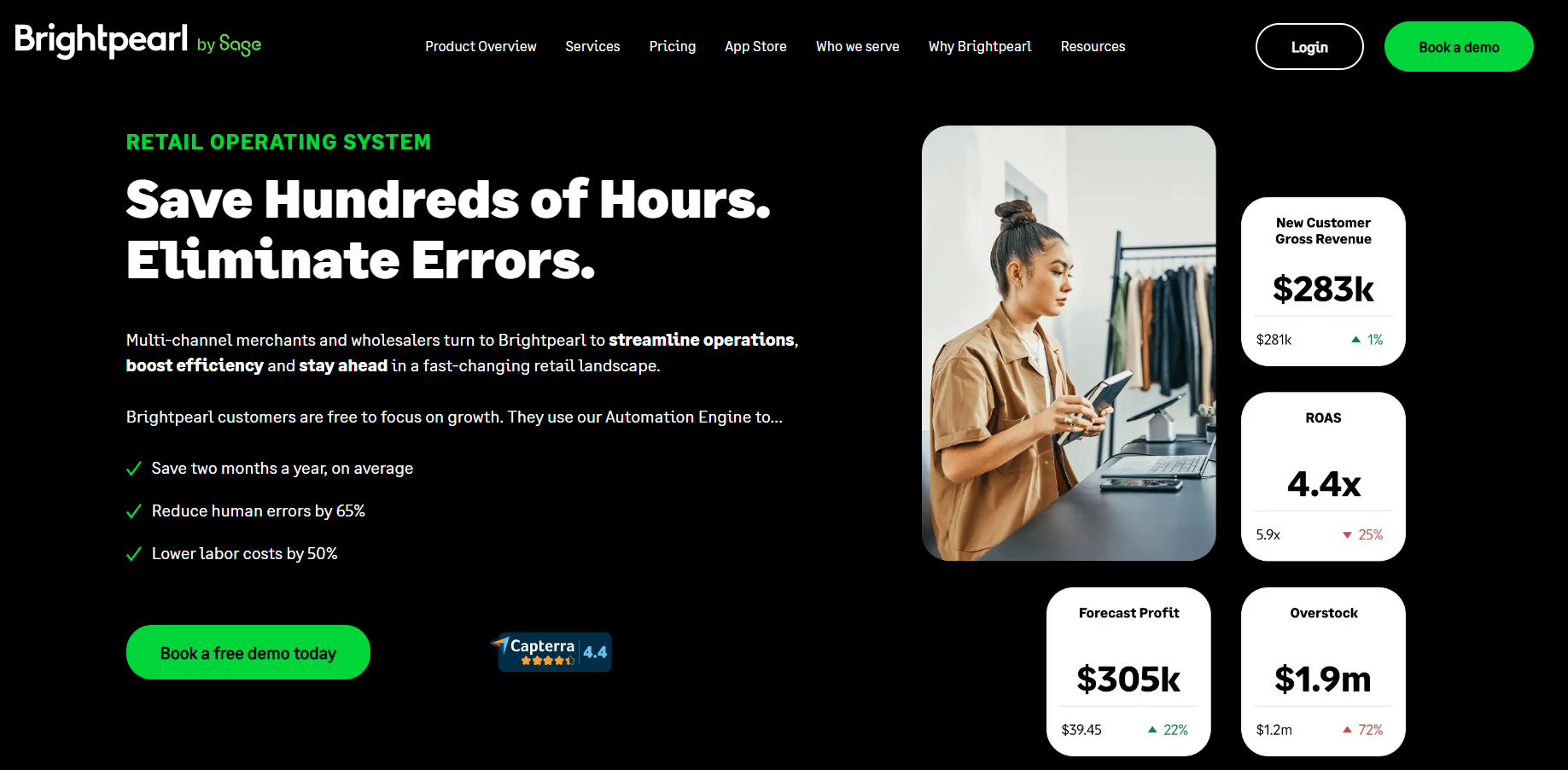
One thing you might like about Brightpearl is its fast setup process. You can connect new sales channels quickly, often in just minutes. This lets you adapt to market changes and seize new opportunities.
A downside of Brightpearl is that it may be too complex for very small businesses. It’s built for larger operations with multiple channels and warehouses.
Brightpearl’s pricing isn’t publicly listed, but it’s generally considered a higher-end solution. You’ll need to contact them for a custom quote based on your business needs.
| Pros | Cons |
| Fast setup for new sales channels | May be complex for small businesses |
| Automated order processing | Higher-end pricing |
| Integrates with many ecommerce systems | Might be more than some businesses need |
We chose Brightpearl for its strong focus on retail and ecommerce operations. It’s not just inventory software, but a full platform for managing your online business.
Brightpearl works best for mid-sized to large ecommerce companies. If you’re selling on multiple channels and need help managing complex inventory, it could be a good fit.
14. Square for Retail
Square for Retail is an ecommerce inventory management software that helps you run your retail business smoothly. It offers a point-of-sale system, online store, and inventory tools all in one place.
You get real-time tracking of your products across multiple locations and sales channels. The system sends alerts when stock is low so you can reorder on time. It also integrates with other apps to expand its features.
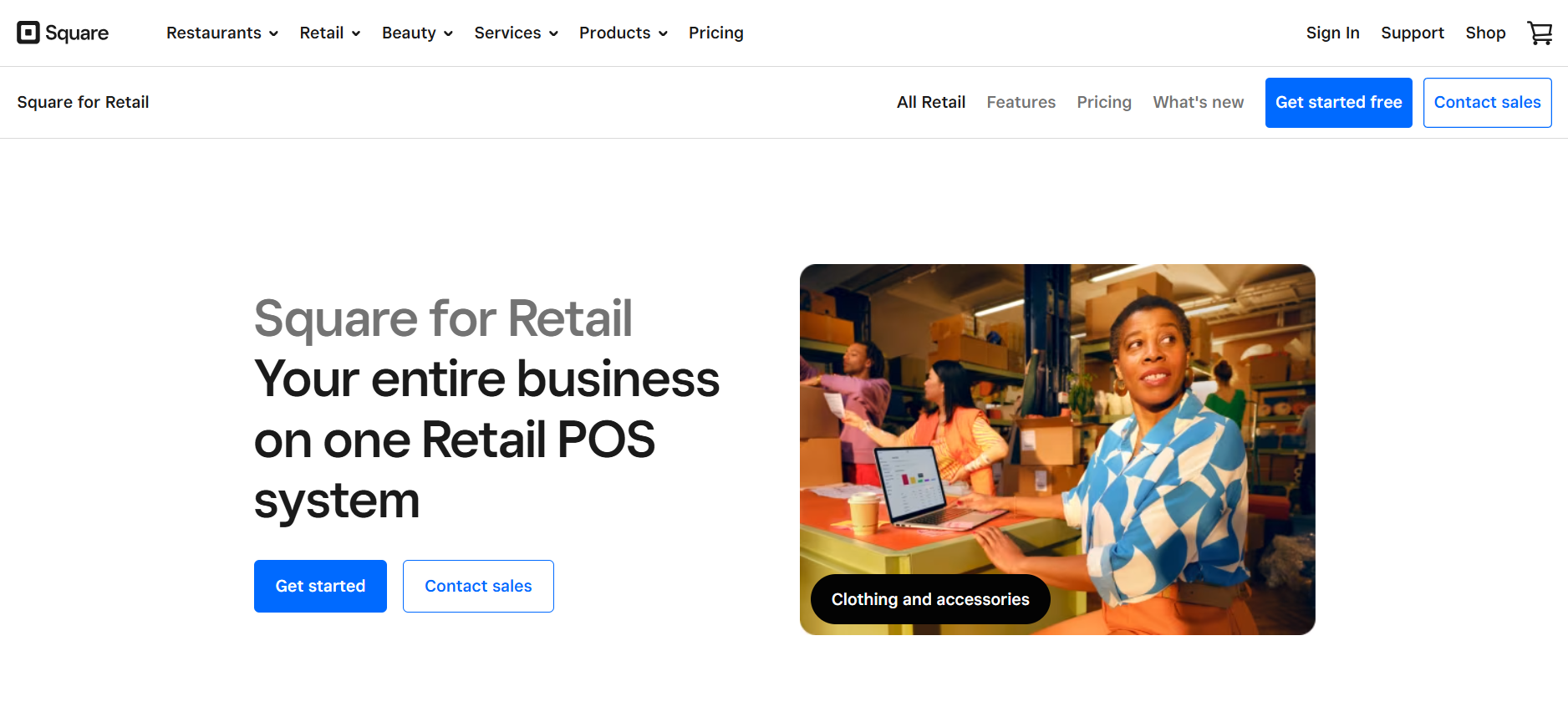
Square for Retail has both free and paid plans. The free plan includes basic inventory and sales tools. Paid plans start at $60 per month and add more advanced features.
We like Square for its user-friendly interface and affordable pricing. It works well for small to medium-sized retailers who want an all-in-one system. The built-in payment processing is also a plus.
On the flip side, larger businesses might find it lacks some advanced features. The reporting tools could also be more detailed.
| Pros | Cons |
| User-friendly interface | Limited advanced features |
| Affordable pricing | Basic reporting tools |
| All-in-one system | May not suit large enterprises |
Square for Retail is a good choice if you want a simple, cost-effective way to manage your inventory and sales. It’s best for small to medium retailers who need a straightforward system to track products and process payments.
15. Unleashed
Unleashed is a cloud-based inventory management platform for small businesses. It offers real-time visibility into stock levels across multiple warehouses. The software integrates with popular ecommerce channels like Amazon, Shopify, and WooCommerce.
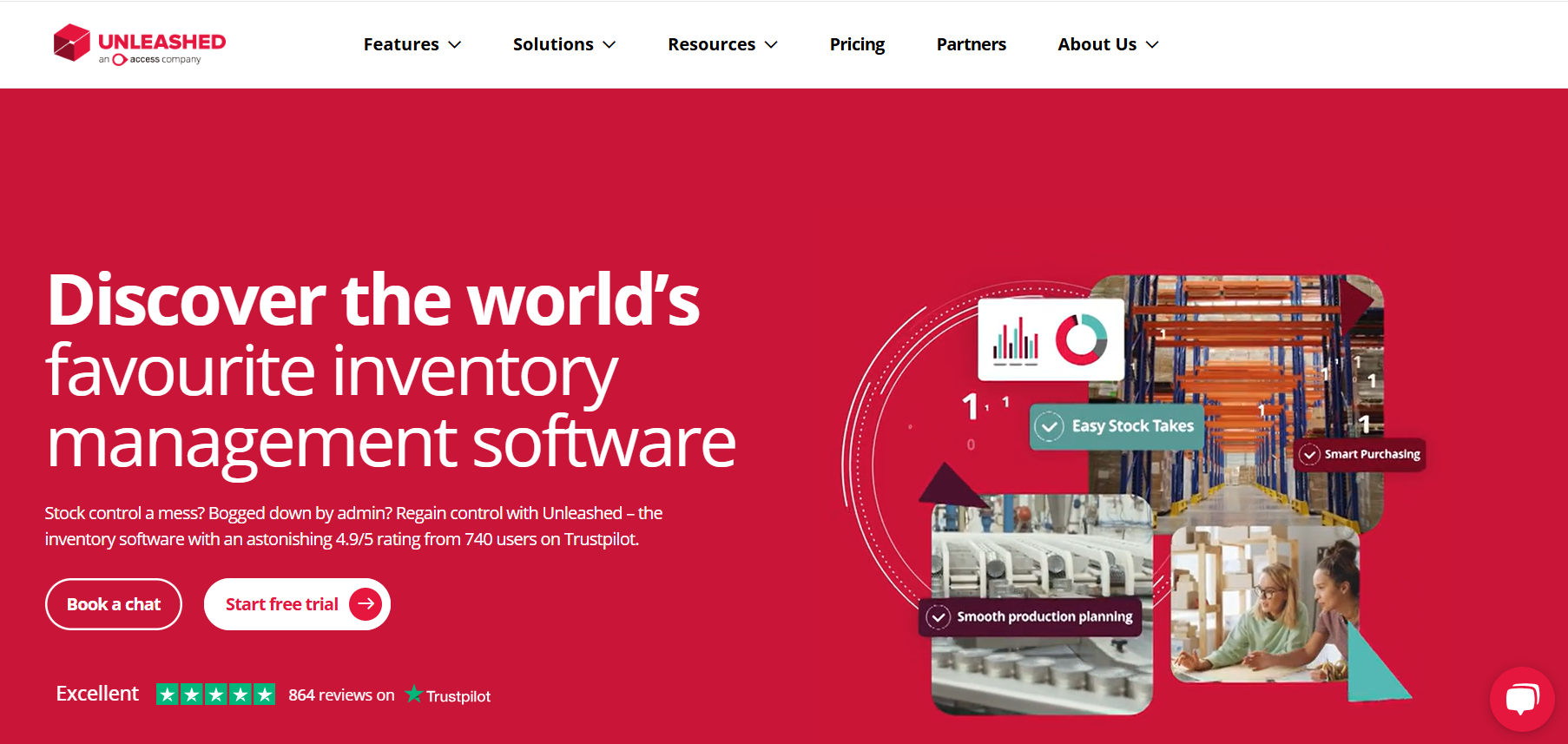
You’ll appreciate Unleashed’s flexibility for different business models. It works well for B2B, D2C, manufacturers, and wholesale distributors. The platform includes a built-in B2B store and multichannel inventory tools to manage all your online sales in one place.
On the downside, Unleashed can be pricey for small operations. Its plans start at $319 per month, which may stretch some budgets. You might also face additional fees for high order volumes through ecommerce integrations.
| Pros | Cons |
| Real-time stock visibility | Expensive for small businesses |
| Multiple ecommerce integrations | Additional fees for high order volumes |
| Strong manufacturing features | May be complex for simple inventory needs |
Unleashed stands out for its strong manufacturing features and excellent customer support. It’s a good fit if you need to manage complex inventory across multiple warehouses.
The software is best for growing businesses with diverse sales channels and more advanced inventory needs. If you’re just starting out or have simple stock management requirements, you may find more affordable options elsewhere.
Conclusion
Selecting the right ecommerce inventory management software is important for growing your business, ensuring accurate stock tracking, and streamlining operations across multiple sales channels. From basic, user-friendly systems to advanced solutions with multi-channel integration and automation, each option reviewed here offers unique benefits. By understanding your business’s specific needs and budget, you can choose a tool that enhances efficiency, prevents stockouts, and supports your growth in the competitive ecommerce landscape.

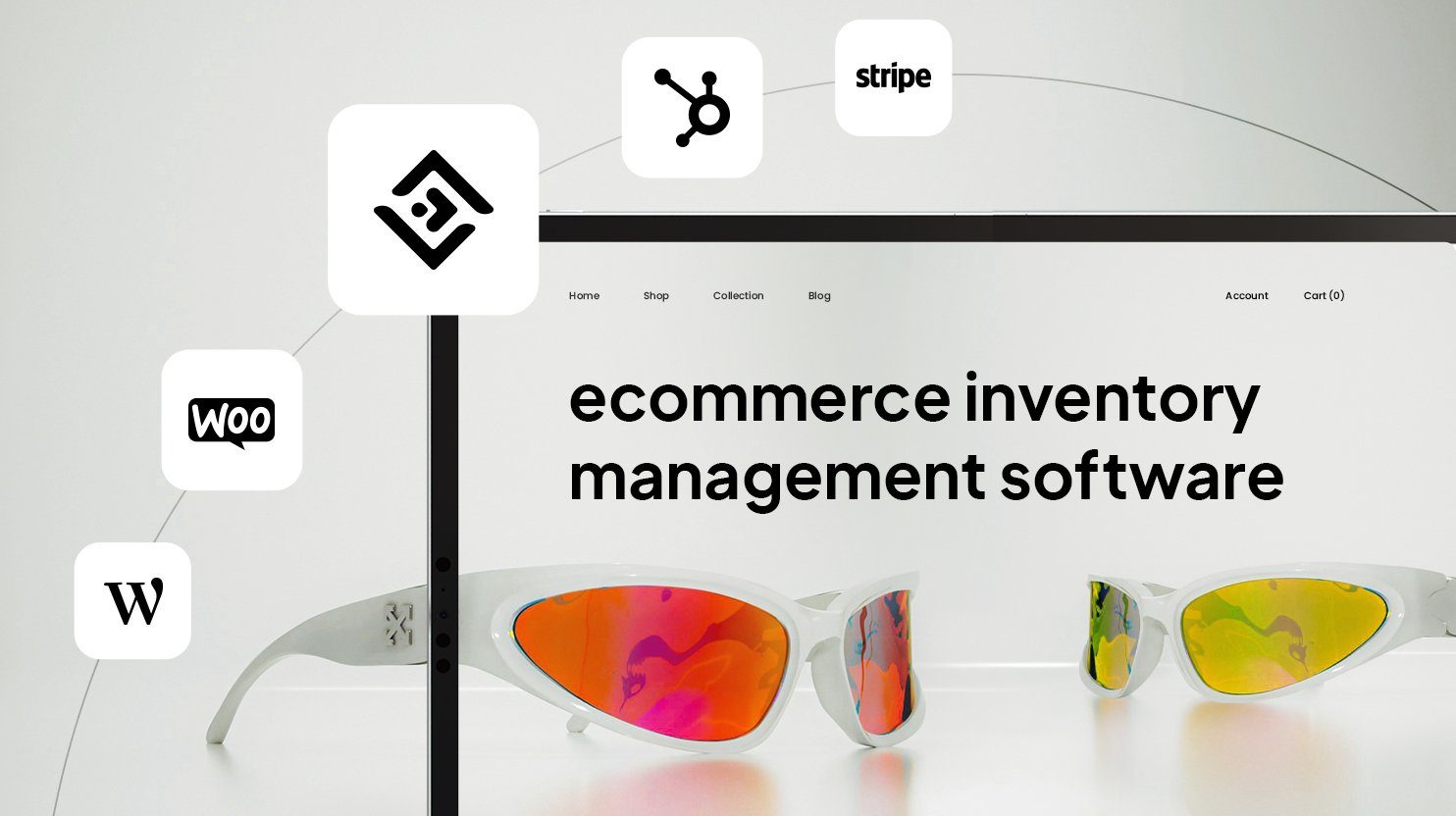

/cdn.vox-cdn.com/uploads/chorus_asset/file/23307885/ajohnson_221103_5070_0004.jpg)





